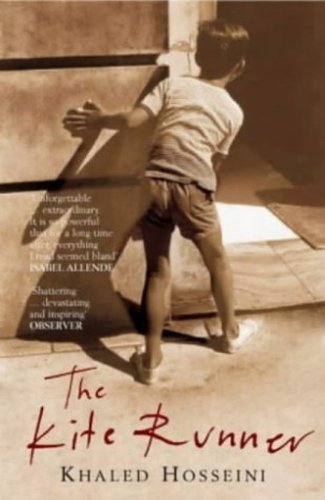 Year of publication: 2003
Year of publication: 2003Genre: fiction
Setting and time: Afghanistan, then California and Pakistan, time spanning from the 1970s to the 2000s
Themes: childhood, friendship, betrayal, violence, war, emigration, father-son relationship, religion, ethnic tensions, neo-colonialism
About the author: Khaled Hosseini was born in in 1965 in Kabul, where his father worked for the Afghanistan Foreign Ministry. From 1970 to 1973 he lived in Teheran, Iran, where his father worked for the embassy of Afghanistan. In 1976 Hosseini’s father moved his family to Paris and he decided not to return to Afghanistan because communists had seized the country in a bloody coup. They sought political asylum in the United States and made their residence in California, where he still lives and works.
Plot: The 1970s, Kabul: Twelve-year-old Amir is desperate to win the local kite-fighting tournament and his loyal friend Hassan promises to help him. But neither of the boys can foresee what will happen to Hassan that afternoon, an event that is to shatter their lives. After the Russians invade and the family is forced to flee to America, Amir realises that one day he must return to an Afghanistan under Taliban rule to find the one thing that his new world cannot grant him: redemption.
Some thoughts: This book gives great insights about life in Afghanistan and about their people: their habits, customs and sufferings. What I found dissatisfying, though, was the historical background behind the novel. It’s true that the novel was written in 2003, when Afghanistan was on television every day because of the ‘war on terror’, but my grasp of geopolitical issues is poor in this case. That’s why I am writing a post on Afghanistan, just to remember what’s happened and what’s still happening in the war-ravaged country. Afghanistan is not only Taliban and fundamentalism, as you learn while reading the book. I didn’t know, for instance, about Pashtun and Hazara people in Afghanistan and it was good to learn such a thing from a fiction book, if you know what I mean.
Nonetheless, I think that this book is a bit overrated. The story is certainly gripping and moving, but predictable at times. It was fairly obvious that Amir would loose his friend Hassan and feel guilty forever, if not from the relationship between the boys then at least from the way he used to treat him. The style could also be improved: Hosseini’s writing gives the impression that this was only a first draft of the story. It must be taken into account that The Kite Runner is Hosseini’s first novel, meaning that his skills will maybe improve. I can understand why this book was a huge best-seller: the story really breaks your heart… but couldn’t the author at least * SPOILER * spare us the horror of a child attempting suicide? I found that slightly cringing and disturbing. * SPOILER *
I really liked this book. Have you read A Thousand Splendid Suns? I thought it was much better.
ReplyDeletei totally agree with you Stefania.
ReplyDeletethe book is not bad, but it is surely overrated.
me too i've found the historical and political background lacking precision and details in many points.
all the part regarding the soviet invasion and the resulting war is missing, but it is the basis to understand what's going on in afghanistan since the 90s.
also, what hosseini shows in the book is the life of a rich, open-minded family in kabul: the customs and traditions of amir's family are those of an elite, they are not the customs and traditions of most of the afghans.
pashtun and hazara... there are so many ethnic groups in afghanistan: there are uzbek, tajik, nomadic populations called kochi...
the pattern of different tribes living in peace in afghanistan till the 70s is one of the most beautiful heritage that all the invasions left to this poor beautiful country since the time of alexander the great.
i agree with natasha too: you should read "a thousand splendid suns". in my opinion is way more beautiful.